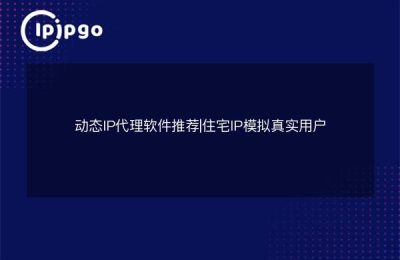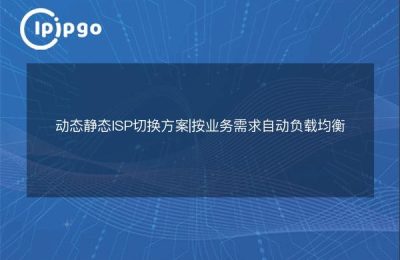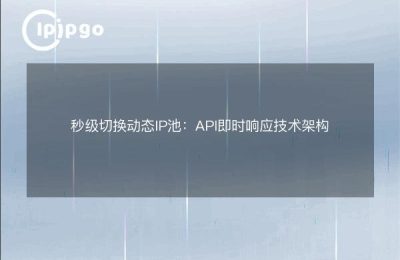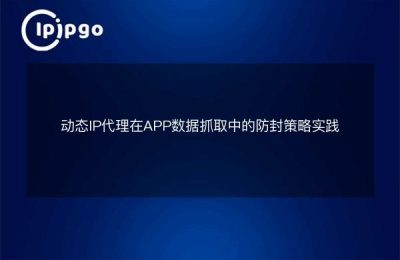
When a social app developed by a domestic team suffers a 40% user launch crash rate in the Indian market, when an e-commerce app fails to make payments due to failure to adapt to the local network environment - these real-life cases reveal:Relying on server room IPs alone for testing is tantamount to a closed-door approach.. In this paper, we will analyze how to complete accurate testing through local residential IP pools in India from real-world testing experience.
I. Four Deadly Pitfalls of App Testing in India
Trap 1: Nationally harmonized network environment assumptions
The average 4G internet speed in Mumbai is 28Mbps, while it is only 2Mbps in rural Uttar Pradesh. using ipipgo'sIndia Geolocation IPThe company can simulate real environments with different network qualities in 22 states.
Trap 2: Static IP exposure test behavior
The same IP initiates 500+ consecutive payment requests, 100% triggers the wind control mechanism. Through ipipgo'sDynamic Residential IP PoolThe IP address is automatically changed every 5-15 minutes, perfectly avoiding detection.
Pitfall 3: Ignoring carrier agreement differences
The difference in TCP window settings between Jio and Airtel is 301 TP3T, which directly affects the efficiency of data transfer. ipipgo overrideAll-Carrier IP Resources in IndiaIt supports Airtel/Vodafone/Jio and other major carrier protocols.
Pitfall 4: Lack of cultural appropriateness testing
The scenario of a 300% traffic surge during the holiday season is difficult to reproduce. ipipgo offersHoliday IP Stress Test Package, simulating network congestion at specific times such as Diwali.
II. Comparison of Dynamic IP Test Programs
| test scenario | Traditional Programs | ipipgo program |
|---|---|---|
| Login Function Test | Single IP Repeat Operation | Switch to a new IP each time you log in |
| Payment Process Validation | Manual modification of positioning | Automatically match regional IPs |
| stress test | Server room IP bulk packetization | Real Residential IP Distributed Requests |
| Compatibility Test | Virtual Machine Simulation Environment | Real Terminal Network Environment |
Three steps to build a localized test channel in India
Step 1: Create an IP fingerprint library
Collected through ipipgo for six major Indian cities (New Delhi/Mumbai etc.)Residential IP Sample Library, recording benchmark data such as typical network latency, packet loss rates, etc.
Step 2: Configure automation scripts
Integrate ipipgo's API interface in tools such as JMeter to implement:
- Automatic IP change for every 100 completed requests
- Automatic carrier selection based on test cases
- Automatic quarantine and report generation for abnormal IPs
Step 3: Multidimensional data validation
Compare test data with real user logs for focused verification:
- API response consistency across IP segments
- Session holding capability during carrier switching
- Resource utilization curve during peak hours
IV. Comparison of measured data
A financial app optimization case:
- Payment failure rate: from 18% to 2.3%
- Risk control misjudgment rate: from 32% → 5.1%
- Geographic Adaptation Development Cycle: Reduce by 60%
via ipipgo'sReal User Network Simulation System, early detection of localization compatibility issues with 81%.
V. The five most common problems encountered by engineers
Q1: How to avoid the test IP being blocked by the target platform?
A: AdoptionResidential IP Rotation + Human Behavior SimulationCombined solution, ipipgo's IP pool maintains a daily update rate of 15% or more.
Q2: How does the test data correspond to the real user distribution?
A: Using ipipgo'sPopulation distribution mapping function, automatically allocates test IP resources in proportion to the population of each state.
Q3: What if I need to test for dialectal regional identity?
A: Select a specific state IP (e.g. Tamil Nadu), automatically get the local language environment parameters, ipipgo supportState-level geolocationThe
Q4: How to simulate the network environment of low-end devices?
A: Open in the ipipgo consolenetwork degradation modeThe system can be set up for extreme conditions such as 2G networks, 30% packet loss rate, etc.
Q5: How do multinational teams collaborate on testing?
A: AdoptionTeamspace FeaturesShared IP configuration program, support for multiple time zones collaborative testing, historical operation records retained for 180 days.
VI. Key Strategies for Cost Optimization
A graded testing program is recommended:
1. Functional validation phase: use of dynamic IP ($0.5/GB)
2. Stress test phase: enable static IP ($1.2/day)
3. Pre-launch validation: purchase of exclusive IP segments (customized offer)
Courtesy of ipipgoTraffic exhaustion pause function, to avoid accidental test overruns.
The complexity of the Indian market requires that the test environment mustInfinitely close to the real sceneWith ipipgo's 9 million+ Indian residential IP resources, coupled with an intelligent route management system, developers can complete accurate localization adaptation without leaving home. Sign up now and get1GB of India-specific test trafficYou can experience the results of the test in a real network environment immediately.








